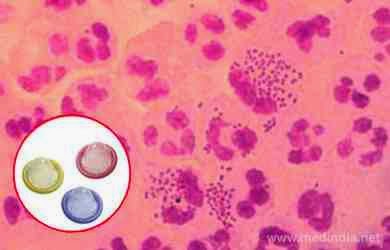gonorrhea infection causes
is caused by the bacterium Neisseria gonorrhoeae. The infection is transmitted from one person to another through vaginal, oral, or anal sex. Men have a 20% risk of getting the infection from a single act of vaginal intercourse with an infected woman. The risk for men that have sex with men is higher. Women have a 60–80% risk of getting the infection from a single act of vaginal intercourse with an infected man. A mother may transmit gonorrhea to her newborn during childbirth; when affecting the infant's eyes, it is referred to as ophthalmia neonatorum. It cannot be spread by toilets or bathrooms.

it infects warm, moist areas of the body, including:
- the urethra (the tube that drains urine from the urinary bladder)
- the eyes
- throat
- vagina
- anus
- reproductive tract (the fallopian
- tubes, cervix, and uterus in women)
References
- National Institute of Allergy and Infectious Diseases; National Institutes of Health, Department of Health and Human Services (2001-07-20). "Workshop Summary: Scientific Evidence on Condom Effectiveness for Sexually Transmitted Disease (STD) Prevention". Hyatt Dulles Airport, Herndon, Virginia. pp14
- "webmd – What Can You Catch in Restrooms? -".
- Barry PM, Klausner JD (March 2009). "The use of cephalosporins for gonorrhea: The impending problem of resistance". Expert Opin Pharmacother 10 (4): 555–77. doi:10.1517/14656560902731993. PMC 2657229. PMID 19284360.
- Deguchi T, Nakane K, Yasuda M, Maeda S (September 2010). "Emergence and spread of drug resistant Neisseria gonorrhoeae". J. Urol. 184 (3): 851–8; quiz 1235. doi:10.1016/j.juro.2010.04.078. PMID 20643433.
- Meyers D, Wolff T, Gregory K et al. (March 2008). "USPSTF recommendations for STI screening". Am Fam Physician 77 (6): 819–24. PMID 18386598.
- Health Care Guideline: Routine Prenatal Care. Fourteenth Edition. By the Institute for Clinical Systems Improvement July 2010.
- section: Prevention
- section: How can gonorrhea be prevented?


































0 comments:
Post a Comment